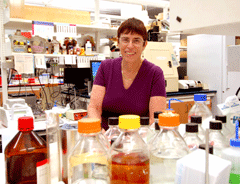BPA Update
Air Date: Week of September 19, 2008

Dr. Nira Ben Jonathan of the University of Cincinnati.
Bisphenol A, a chemical used in the lining of canned goods and in plastic baby bottles and many water bottles, has come under fire recently as a growing body of scientific evidence shows that the compound may be harmful to humans. One new study shows that people with high levels of BPA are more than twice as likely to develop heart disease and diabetes. Dr. Nira Ben Jonathan of the University of Cincinnati College of Medicine just published a new study that looks at the effects of BPA on humans. As she tells host Bruce Gellerman, she found that when low levels of BPA are added to human fat tissue, it suppressed a hormone that regulates insulin.
Transcript
GELLERMAN: It's Living on Earth, I'm Bruce Gellerman.
Bisphenol A is one of the most commonly used chemicals in the world. You’ll find BPA used in everything from plastic water bottles, and kids’ sippy cups to the lining of food cans.
You’ll also find it in more than 90 percent of people, and that may be cause for concern. Because new research - reported in the most recent issue of the Journal of the American Medical Association - suggests that people with high levels of BPA are three times as likely to develop heart disease and have a two-and-a-half times higher risk of diabetes than those with low levels.
These new findings were largely unexpected. Scientists are still trying to understand just how BPA acts once it’s inside the body. Dr. Nira Ben-Jonathan from the University of Cincinnati College of Medicine is one of those researchers. She says she was surprised to find that when she added BPA to human fat tissue, it suppressed a hormone in the body that regulates insulin called adiponectin.
BEN-JONATHAN: The low levels of bisphenol A, which mimic the environmental exposure that people are usually exposed to, reduce the secretion of a very important hormone adiponectin which is produced by fat tissue, and it’s protecting people from diabetes, cardiovascular diseases and arteriosclerosis. Almost in every patient, bisphenol A reduced the amount of adiponectin by anywhere from 20 percent to 50 or 60 percent.
GELLERMAN: So the amounts of bisphenol A that you added – would I have it in my body?
BEN-JONATHAN: Exactly. Many studies use very large amounts of bisphenol A, which is not something you would expect the find in people’s circulation or in the blood. But we selected doses of bisphenol A which exactly match the range of exposure that you find in over 90% of people.
GELLERMAN: Well, there’s another new study which was published in the Journal of the American Medical Association by a Dr. David Melcer. Are you familiar with that one?

Dr. Nira Ben Jonathan of the University of Cincinnati.
GELLERMAN: What would you like to see happen now regarding bisphenol A?
BEN-JONATHAN: I think we really need to take caution about this chemical because it’s very widespread, it’s one of the highest chemicals in commerce and I think that we’re exposed to it from multiple sources – from plastic bottles, from canned food, from medical tubings. And it’s fairly stable, but small, very tiny, amounts will be released and you get it into your system and it’s there.
GELLERMAN: Dr. Nira Ben-Jonathan is a professor at the University of Cincinnati College of Medicine. Her team’s research was published in the journal Environmental Health Perspectives. Well, Dr. Ben-Jonathan, thank you very much.
BEN-JONATHAN: My pleasure.
Links
Living on Earth wants to hear from you!
Living on Earth
62 Calef Highway, Suite 212
Lee, NH 03861
Telephone: 617-287-4121
E-mail: comments@loe.org
Newsletter [Click here]
Donate to Living on Earth!
Living on Earth is an independent media program and relies entirely on contributions from listeners and institutions supporting public service. Please donate now to preserve an independent environmental voice.
NewsletterLiving on Earth offers a weekly delivery of the show's rundown to your mailbox. Sign up for our newsletter today!
 Sailors For The Sea: Be the change you want to sea.
Sailors For The Sea: Be the change you want to sea.
 The Grantham Foundation for the Protection of the Environment: Committed to protecting and improving the health of the global environment.
The Grantham Foundation for the Protection of the Environment: Committed to protecting and improving the health of the global environment.
 Contribute to Living on Earth and receive, as our gift to you, an archival print of one of Mark Seth Lender's extraordinary wildlife photographs. Follow the link to see Mark's current collection of photographs.
Contribute to Living on Earth and receive, as our gift to you, an archival print of one of Mark Seth Lender's extraordinary wildlife photographs. Follow the link to see Mark's current collection of photographs.
 Buy a signed copy of Mark Seth Lender's book Smeagull the Seagull & support Living on Earth
Buy a signed copy of Mark Seth Lender's book Smeagull the Seagull & support Living on Earth

